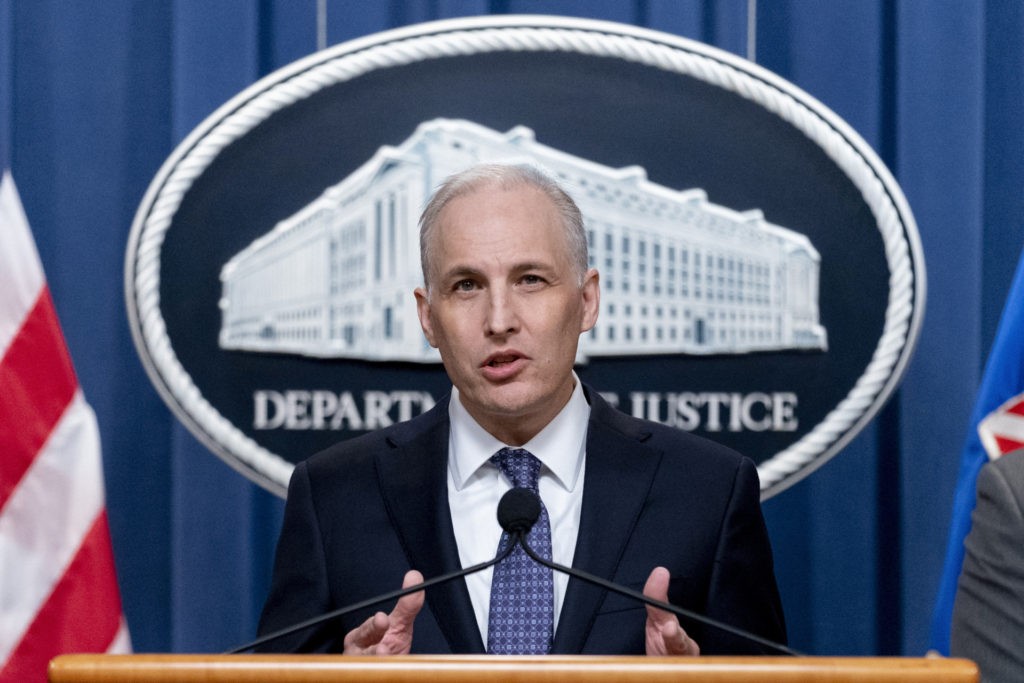Biden Administration ‘Worried’ 2008 Warrantless Wiretap Spy Law Will Lapse
The Biden administration is reportedly worried a 2008 spy law permitting warrantless wiretaps will not be renewed by Congress, as lawmakers on both the left and right have expressed privacy concerns.
With the law set to expire at the end of 2023, the administration “is so worried” about renewing the legislation that “it has begun the push to lobby for reauthorization 10 months before the law sunsets,” the Washington Post reported.
“Its value cannot be overstated,” Assistant Attorney General Matthew Olsen said Tuesday at the Brookings Institution. “Without 702, we will lose indispensable intelligence for our decision-makers and warfighters, as well as those of our allies. And we have no fallback authority that could come close to making up for that loss.”

Justice Department’s Assistant Attorney General for the National Security Division Matthew Olsen. (AP Photo/Andrew Harnik)
The law under Section 702 grants federal agencies the ability to wiretap Americans without probable cause in certain circumstances, according to the Post:
Section 702 allows the FBI and the National Security Agency to gather emails, text messages and other electronic data from U.S. tech firms like Google, Microsoft, Apple and Meta without a traditional warrant based on probable cause when the target is a foreigner overseas and it’s for foreign intelligence purposes, such as counterterrorism, nuclear proliferation, espionage and cyberattacks.
The material gathered goes into a database and that surveillance is subject to oversight by a federal court, Congress, the Justice Department and the Office of the Director of National Intelligence. The FBI is granted access to only a portion of that database.
But the left and right have criticized the law for different reasons. Privacy advocates are largely focused on a subset of 702 collection — the FBI’s searches of a fraction of the 702 database for leads in counterespionage, cyber or counterterrorism probes. The FBI does not need a warrant in most cases to scour the database of foreign targets for an email address, but because the target may have been in communication with a U.S. citizen or resident and that email may be in the database, the lack of a warrant requirement has long concerned privacy advocates.

In this January 18, 2017, file photo, President Barack Obama speaks during his final presidential news conference in the briefing room of the White House in Washington. (AP Photo/Pablo Martinez Monsivais)
The law was initially passed in 2008 when the Obama administration was worried about middle east terrorism. Since then, it has been reauthorized twice by Congress with increasingly narrower scopes.
Critics and privacy advocates say the law permits warrantless searches of American email accounts that have interfaced with foreign targets. But some in the intelligence community claim the Americans incidentally caught up in the data collection are of a small amount.

President Joe Biden speaks at an event to celebrate Black History Month, Monday, February 27, 2023, in the East Room of the White House in Washington. (AP Photo/Alex Brandon)
“We’re talking only about the subset of national security targets the FBI is worried about, mainly in counterintelligence and counterterrorism cases — and only if they think there’s some foreign connection. They can’t just search that database for some routine domestic crime,” former NSA general counsel Glenn Gerstell told the Post.
The expiring legislation comes as many Americans do not trust the FBI in the wake of its spying on former President Donald Trump’s 2016 campaign, alleged failure to investigate Hunter Biden’s “Laptop from Hell,” and recent bombshell revelation that former New York FBI spy chief was indicted for violating U.S. sanctions by agreeing to provide services to a Russian oligarch.
House Republicans have launched a “Weaponization” subcommittee to investigate the FBI’s politicization. But the White House is apparently unhappy the House select subcommittee would conduct hearings on the weaponization of government. In a letter released just hours before its first hearing, the special assistant to President Joe Biden, Ians Sams, slammed the subcommittee as an “Un-American” political stunt that is only a priority of MAGA Republicans.
Follow Wendell Husebø on Twitter @WendellHusebø. He is the author of Politics of Slave Morality.





Comments are closed.